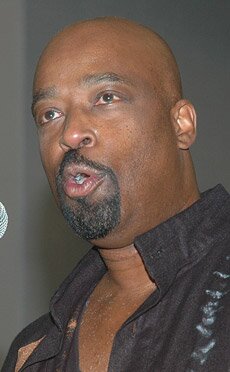 |
 |
 |
|
|
|||||||||||||
|
|
|||||||||||||
| Email Article | Printable Page |
"I Get Tired of People . . . (Who) Only Want the Dirt"
 |
|
Photo credit: Reginald Christian/Albany State University
"God made an example out of me," said J.L. King
|
J.L. King sat down at Albany State University for an interview with Terence Turner of the student newspaper, The Student Voice.
Q: What made you speak out and become an activist for the lifestyle and the consequences that being on the “down low” brings?
King: It wasn’t a choice I made. I did not want to write a book. But spiritually, I felt . . . the Lord told me to do so. He told me to tell my story, and I felt it was the right thing to educate our people, being how I should have been infected a long time ago.
Q. Do you feel that you are contradicting yourself and the “word” that you received from God, seeing how you sleep with men and committed adultery?
King: Life is about change. When my wife busted me, God made an example out of me. He takes the lowest of us and shows the potential for deliverance. He allowed me to step outside and analyze my behavior and put me in a position to make better choices and help others do the same.
Q. Your research stated that more and more black men are assuming active roles in the “down low” lifestyle. Do you think men are doing it because it is becoming more “trendy,” or is there something that society is not seeing?
|
MORE JL KING
|
King: In certain communities, being on the down low is accepted. It is becoming more of a “badge of honor,” being on the down low. Some men just consider themselves bi-curious. “I’m just a freak, so if I made a connection with a brother, I knew that I had him.” A lot of it deals with sexual addiction.
Q. So what is making it popular on college campuses?
King: Universities are not teaching young men street smarts. There should be more grass-roots training in higher education. Sexual responsibility is becoming casual conversation instead of being incorporated. A lot of young brothers are getting caught out there because they are ignorant and naive to the changes occurring in society and are getting turned out easily. I’ve done it and it is still happening today, even here at Albany State.
Q. Do you think the behavior is natural or is induced by different influences?
King: It’s a little of both. All the men I interviewed for the book said that if they could change it, they would.
Q. During the convocation, you repeatedly referred to different fraternal organizations and their lack of support. What do you feel is discouraging fraternities from addressing the issue?
King: Many fraternity leaders are in denial and won’t acknowledge homosexual members. Because of the creed many of the organizations follow, they attempt to keep things secret in order to protect a “manly” image. What needs to happen is more education and advocacy for those members. For instance, I attended the Alpha Phi Alpha Boule in Atlanta a few years back. I was invited to a down low party that some members hosted so they could feel at home and not be left out. When I saw members from other frats there, it’s kind of like a fraternity within a fraternity.
Q. How is the religious sector of society dealing with the issue?
King: Many pastors and members fight with their sexuality. Most men search for men in the search so they can make that connection. Some of the preachers condemning it are participants themselves, so it’s almost a “Do as I say, and not as I do” situation. What is now becoming common is that they separate homosexuality from the message so the gay members are not uncomfortable.
Q. What are you finding to be the difficult part of HIV and AIDS prevention?
King: People are giving up. There is too much talking going on and not enough action. All these committees are meeting, talking about the same thing. We need to be serious about winning this battle. Think about it: A cure for HIV would put a lot of these groups out of business. Folks just want the money for the research, but no action is being implemented. When I come to the South, which I like to call the “Bible Belt,” the message of abstinence is being enforced. To me, that’s not realistic, because it’s going to happen. Preach the caution that needs to be taken. It’s all financial. There will be a vaccine before a cure. Why? Because more money will be spent preventing it from happening instead of trying to cure those who have it. It’s all about numbers. More people don’t have it, so that means more profit. Condom makers would go out of business then.
Q. What is your purpose right now and your plea to the citizens of Albany, the United States, and even the world?
King: I’m here to educate and present info about this deadly situation. I get tired of people wanting to see me speak, but only want the dirt. If more time was spent listening and caring for the prevention instead of women asking, “Mr. King, what are the signs?” I promise that the numbers will decrease. Let’s offer more support systems. My overall plea to everyone is wear condoms and please be safe.
Posted Oct. 8, 2004
In Culture
A "Golden Era" Hip-Hop Artist Reflects
Kwanzaa Challenges Black Students With Opportunity
From "Starving Artist" to Hit Film
| Home | News | Sports | Culture | Voices | Images | Projects | About Us Copyright © 2005 Black College Wire. Black College Wire is a project of the Black College Communication Association and the Robert C. Maynard Institute for Journalism Education. |